Invited Panels
Using Evidence-Based Practices to Address PTSD Among Diverse Communities: Barriers, Opportunities and Innovations in Addressing Cultural Adaptation of PTSD Treatments
Moderator: Debra Kaysen, PhD ABPP
Panelists: Angela Nickerson, PhD; Annjeanette Belcourt, PhD; Monnica Williams, PhD; Luana Marques, PhD
Saturday, November 14, 2pm – 3:15pm
The PTSD literature has demonstrated support for brief, effective interventions but there is a gap in access to these treatments for ethnically and culturally diverse clients, for clients who are gender or sexual minorities, and for individuals residing in low- and middle-income countries. Psychotherapies occur within a multicultural context where clients and therapists each bring their own cultural lens to the process. Culture is also not monolithic—both in terms of subgroups and individual differences in terms of their own identity and lived experiences. Individuals also may not fit just in one category, but may instead have multiple intersectional identities that all impact what they bring into the therapy. Yet, PTSD treatments are often not developed for or tested with diverse patient populations. There is increasing evidence that evidence-based practices and cultural competency can be complementary. This panel aims to synthesize existing knowledge regarding innovations in this field, drawing from the panelists' wide range of experiences working with diverse patient groups across various treatment approaches and settings. The panelists, based on their expertise in working with Black, Indigenous and Latinx communities, as well as working with refugees, will offer novel insights with regard to the methods, challenges and opportunities for cultural adaptation of PTSD treatment.
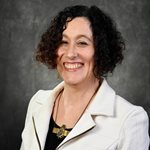 Debra Kaysen is a clinical psychologist and Professor in the Department of Psychiatry and Behavioral Sciences at Stanford University. Dr. Kaysen is currently the President of the International Society for Traumatic Stress Studies (www.istss.org). Dr. Kaysen’s area of specialty both in research and clinical work is in treatment for those who have experienced traumatic events including treatment of PTSD and related disorders. She has conducted critical studies on treatment of PTSD and/or substance use across a variety of populations (sexual minority women, Native Americans, sexual assault survivors, torture survivors, active duty military) and in a variety of settings (the Democratic Republic of Congo, Iraq, primary care, rural settings), with an emphasis on increasing access to care. Other research conducted by Dr. Kaysen has focused on increasing our understanding of how PTSD and substance use may influence each other. Her research has been funded by the National Institute of Alcohol Abuse and Alcoholism, the National Institute of Drug Abuse, the National Institute on Minority Health and Health Disparities, the Department of Defense, PCORI, and USAID. Dr. Kaysen's work has been featured in major media outlets such as the Washington Post, New York Times, NPR, The Hill, the Economist, and on This American Life (https://www.thisamericanlife.org/682/ten-sessions).
Debra Kaysen is a clinical psychologist and Professor in the Department of Psychiatry and Behavioral Sciences at Stanford University. Dr. Kaysen is currently the President of the International Society for Traumatic Stress Studies (www.istss.org). Dr. Kaysen’s area of specialty both in research and clinical work is in treatment for those who have experienced traumatic events including treatment of PTSD and related disorders. She has conducted critical studies on treatment of PTSD and/or substance use across a variety of populations (sexual minority women, Native Americans, sexual assault survivors, torture survivors, active duty military) and in a variety of settings (the Democratic Republic of Congo, Iraq, primary care, rural settings), with an emphasis on increasing access to care. Other research conducted by Dr. Kaysen has focused on increasing our understanding of how PTSD and substance use may influence each other. Her research has been funded by the National Institute of Alcohol Abuse and Alcoholism, the National Institute of Drug Abuse, the National Institute on Minority Health and Health Disparities, the Department of Defense, PCORI, and USAID. Dr. Kaysen's work has been featured in major media outlets such as the Washington Post, New York Times, NPR, The Hill, the Economist, and on This American Life (https://www.thisamericanlife.org/682/ten-sessions).
 Angela Nickerson is Professor at the School of Psychology at UNSW Sydney, and Director of the Refugee Trauma and Recovery Program. Her research focuses on understanding the psychological mechanisms underpinning refugee and post-conflict mental health, and developing effective interventions for traumatic stress reactions in refugees. She is also interested in the impact of policy on refugee mental health, and cross-cultural considerations in psychological processes. She has worked with refugee and post-conflict populations in Australia, Indonesia, Timor-Leste, Switzerland, and the United States.
Angela Nickerson is Professor at the School of Psychology at UNSW Sydney, and Director of the Refugee Trauma and Recovery Program. Her research focuses on understanding the psychological mechanisms underpinning refugee and post-conflict mental health, and developing effective interventions for traumatic stress reactions in refugees. She is also interested in the impact of policy on refugee mental health, and cross-cultural considerations in psychological processes. She has worked with refugee and post-conflict populations in Australia, Indonesia, Timor-Leste, Switzerland, and the United States.
 Monnica T. Williams is a board-certified licensed clinical psychologist and Associate Professor at the University of Ottawa, in the School of Psychology, where she is the Canada Research Chair in Mental Health Disparities. She is also the Clinical Director of the Behavioral Wellness Clinic in Connecticut, where she provides supervision and training to clinicians for empirically-supported treatments. Prior to her move to Canada, Dr. Williams was on the faculty of the University of Pennsylvania Medical School (2007-2011), the University of Louisville in Psychological and Brain Sciences (2011-2016), where she served as the Director of the Center for Mental Health Disparities, and the University of Connecticut (2016-2019) where she had appointments in both Psychological Science and Psychiatry. Dr. Williams' research focuses on African American mental health, culture, and psychopathology, and she has published over 100 scientific articles on these topics. Current projects include the assessment of race-based trauma, unacceptable thoughts in OCD, improving cultural competence in the delivery of mental health care services, and interventions to reduce racism. This includes her work as a PI in a multisite study of MDMA-assisted psychotherapy for PTSD for people of color. She also gives diversity trainings nationally for clinical psychology programs, scientific conferences, and community organizations. Dr. Williams is a member of the American Psychological Association (APA), having served as the diversity delegate from Kentucky for the APA State Leadership Conference for two consecutive years. She has served as the African American SIG leader for Association of Behavioral and Cognitive Therapies (ABCT), and she serves as an associate editor of The Behavior Therapist and New Ideas in Psychology. She also serves on the editorial board of Cognitive Behaviour Therapy, and the Journal of Obsessive Compulsive and Related Disorders. She is a member of the Scientific Advisory Board of the International OCD Foundation, and co-founded their Diversity Council. Her work has been featured in several major media outlets, including NPR, CBS, Huffington Post, and the New York Times.
Monnica T. Williams is a board-certified licensed clinical psychologist and Associate Professor at the University of Ottawa, in the School of Psychology, where she is the Canada Research Chair in Mental Health Disparities. She is also the Clinical Director of the Behavioral Wellness Clinic in Connecticut, where she provides supervision and training to clinicians for empirically-supported treatments. Prior to her move to Canada, Dr. Williams was on the faculty of the University of Pennsylvania Medical School (2007-2011), the University of Louisville in Psychological and Brain Sciences (2011-2016), where she served as the Director of the Center for Mental Health Disparities, and the University of Connecticut (2016-2019) where she had appointments in both Psychological Science and Psychiatry. Dr. Williams' research focuses on African American mental health, culture, and psychopathology, and she has published over 100 scientific articles on these topics. Current projects include the assessment of race-based trauma, unacceptable thoughts in OCD, improving cultural competence in the delivery of mental health care services, and interventions to reduce racism. This includes her work as a PI in a multisite study of MDMA-assisted psychotherapy for PTSD for people of color. She also gives diversity trainings nationally for clinical psychology programs, scientific conferences, and community organizations. Dr. Williams is a member of the American Psychological Association (APA), having served as the diversity delegate from Kentucky for the APA State Leadership Conference for two consecutive years. She has served as the African American SIG leader for Association of Behavioral and Cognitive Therapies (ABCT), and she serves as an associate editor of The Behavior Therapist and New Ideas in Psychology. She also serves on the editorial board of Cognitive Behaviour Therapy, and the Journal of Obsessive Compulsive and Related Disorders. She is a member of the Scientific Advisory Board of the International OCD Foundation, and co-founded their Diversity Council. Her work has been featured in several major media outlets, including NPR, CBS, Huffington Post, and the New York Times.
 Annjeanette Belcourt (Otter Woman) is an American Indian Professor in the College of Health at the University of Montana’s Pharmacy Practice and School of Public and Community Health Sciences Departments (enrolled tribal member of the Three Affiliated Tribes, Mandan, Hidatsa, Blackfeet, and Chippewa descent). She completed her clinical training and doctoral studies in clinical psychology with advanced postdoctoral science training completed at the Centers for American Indian and Alaska Native Health. She has worked clinically with diverse populations, including combat veterans, Native Americans, and low-income populations specializing in posttraumatic stress reactions and multiple psychiatric conditions. Her research and clinical priorities include mental health disparities, posttraumatic stress reactions, risk, resiliency, psychiatric disorder, and environmental public health within the cultural context of American Indian communities.
Annjeanette Belcourt (Otter Woman) is an American Indian Professor in the College of Health at the University of Montana’s Pharmacy Practice and School of Public and Community Health Sciences Departments (enrolled tribal member of the Three Affiliated Tribes, Mandan, Hidatsa, Blackfeet, and Chippewa descent). She completed her clinical training and doctoral studies in clinical psychology with advanced postdoctoral science training completed at the Centers for American Indian and Alaska Native Health. She has worked clinically with diverse populations, including combat veterans, Native Americans, and low-income populations specializing in posttraumatic stress reactions and multiple psychiatric conditions. Her research and clinical priorities include mental health disparities, posttraumatic stress reactions, risk, resiliency, psychiatric disorder, and environmental public health within the cultural context of American Indian communities.
 Luana Marques is the Director of Community Psychiatry PRIDE and Associate Director of the Center for Anxiety and Traumatic Stress Disorders at Massachusetts General Hospital (MGH), as well as an Associate Professor of Psychiatry at Harvard Medical School. She completed her Ph.D. in Clinical Psychology at the State University of New York (SUNY) at Buffalo and her clinical internship in the Cognitive Behavioral Track (CBT) at Massachusetts General Hospital/Harvard Medical School in 2007. Recognized as a national and international expert in Cognitive Behavioral Therapies (CBTs) with over 10 years of experience conducting clinical research in health disparities and trauma-related disorders, Dr. Marques’ major clinical and research interests include the implementation of evidence-based practices for individuals suffering from a variety of behavioral health disorders in diverse communities. Through her research she aims to decrease disparities in care for individuals experiencing behavioral health difficulties, especially among low-income and ethnic minorities.
Luana Marques is the Director of Community Psychiatry PRIDE and Associate Director of the Center for Anxiety and Traumatic Stress Disorders at Massachusetts General Hospital (MGH), as well as an Associate Professor of Psychiatry at Harvard Medical School. She completed her Ph.D. in Clinical Psychology at the State University of New York (SUNY) at Buffalo and her clinical internship in the Cognitive Behavioral Track (CBT) at Massachusetts General Hospital/Harvard Medical School in 2007. Recognized as a national and international expert in Cognitive Behavioral Therapies (CBTs) with over 10 years of experience conducting clinical research in health disparities and trauma-related disorders, Dr. Marques’ major clinical and research interests include the implementation of evidence-based practices for individuals suffering from a variety of behavioral health disorders in diverse communities. Through her research she aims to decrease disparities in care for individuals experiencing behavioral health difficulties, especially among low-income and ethnic minorities.
How I Now Think Differently About Early Intervention and Prevention
Moderators: Meaghan O'Donnell, PhD and Nancy Kassam-Adams, PhD
Panelists: Jon Bisson, MD; Richard Bryant, PhD; Andrés Fresno, PhD; Richard Meiser-Stedman, PhD; Patricia Watson, PhD
Thursday, November 12, 5pm – 6:15pm
This panel brings together experts from multiple continents to discuss key issues in early intervention and prevention. The panel will address the evidence base, the usefulness of these approaches, practical challenges in implementation in different settings, as well as issues of cultural responsiveness and health equity. We hope to spark discussion and healthy debate around these crucial topics, identify knowledge and practice gaps, and inform the research/practice/public health agenda in this arena. Examples pertaining to COVID-19 will be raised where possible. Panel members have expertise in developing and evaluating models of early intervention/prevention for adults, children and communities and have experience in putting these models into practice in a range of settings and contexts.
.jpg?width=150&height=150) Meaghan O'Donnell
Meaghan O'Donnell
Head of Research, Phoenix Australia: Centre for Posttraumatic Mental Health
Professor, Department of Psychiatry, University of Melbourne
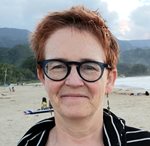 Nancy Kassam-Adams is Research Professor of Pediatrics, University of Pennsylvania Perelman School of Medicine, and Associate Director for Behavioral Research at the Center for Injury Research and Prevention at the Children’s Hospital of Philadelphia. Dr. Kassam-Adams also directs the Center for Pediatric Traumatic Stress, which provides training and resources to help healthcare professionals and healthcare systems across the US provide trauma-informed pediatric healthcare. For nearly 25 years, Dr. Kassam-Adams’ research has focused on understanding how children and families respond to potentially traumatic events such as injury, violence, and illness / medical experiences, and on developing practical and effective secondary prevention protocols for traumatic stress that can be integrated in pediatric health care settings or delivered broadly via eHealth tools. Dr. Kassam-Adams also leads the Child Trauma Data Archives, and is actively engaged in international collaborative efforts to make traumatic stress research data more findable, accessible, and re-usable. She works with several initiatives within the Global Collaboration on Traumatic Stress that focus on promoting collaboration across boundaries in the traumatic stress field. She is a Past President of the International Society for Traumatic Stress Studies, and has been appointed to several national and international expert consensus groups on child traumatic stress.
Nancy Kassam-Adams is Research Professor of Pediatrics, University of Pennsylvania Perelman School of Medicine, and Associate Director for Behavioral Research at the Center for Injury Research and Prevention at the Children’s Hospital of Philadelphia. Dr. Kassam-Adams also directs the Center for Pediatric Traumatic Stress, which provides training and resources to help healthcare professionals and healthcare systems across the US provide trauma-informed pediatric healthcare. For nearly 25 years, Dr. Kassam-Adams’ research has focused on understanding how children and families respond to potentially traumatic events such as injury, violence, and illness / medical experiences, and on developing practical and effective secondary prevention protocols for traumatic stress that can be integrated in pediatric health care settings or delivered broadly via eHealth tools. Dr. Kassam-Adams also leads the Child Trauma Data Archives, and is actively engaged in international collaborative efforts to make traumatic stress research data more findable, accessible, and re-usable. She works with several initiatives within the Global Collaboration on Traumatic Stress that focus on promoting collaboration across boundaries in the traumatic stress field. She is a Past President of the International Society for Traumatic Stress Studies, and has been appointed to several national and international expert consensus groups on child traumatic stress.
 Jon Bisson is a practising psychiatrist and professor in psychiatry at Cardiff University. He is Director of All Wales Traumatic Stress Quality Improvement Initiative. He developed his interest in post-traumatic stress disorder (PTSD) during his time as a psychiatrist in the Britsh Army. He has conducted various studies including two widely cited randomised controlled trials of early psychological interventions following traumatic events and five Cochrane systematic reviews in the traumatic stress field. He was co-chair of the UK’s first PTSD NICE Guideline Development Group and chairs the International Society for Traumatic Stress Studies’ Treatment Guidelines Committee. He developed and continues to lead Cardiff University’s Traumatic Stress Research Group. He developed and was the first director of NHS Veterans Wales.
Jon Bisson is a practising psychiatrist and professor in psychiatry at Cardiff University. He is Director of All Wales Traumatic Stress Quality Improvement Initiative. He developed his interest in post-traumatic stress disorder (PTSD) during his time as a psychiatrist in the Britsh Army. He has conducted various studies including two widely cited randomised controlled trials of early psychological interventions following traumatic events and five Cochrane systematic reviews in the traumatic stress field. He was co-chair of the UK’s first PTSD NICE Guideline Development Group and chairs the International Society for Traumatic Stress Studies’ Treatment Guidelines Committee. He developed and continues to lead Cardiff University’s Traumatic Stress Research Group. He developed and was the first director of NHS Veterans Wales.
 Richard Bryant is Scientia Professor of Psychology, University of New South Wales, NHMRC Senior Principal Research Fellow, and Director of the UNSW Traumatic Stress Clinic. He has published over 600 journal articles on trauma and PTSD, with a particular focus on early intervention. He has served on both the DSM-5 and ICD-11 committees rewriting the new diagnoses for PTSD. He has conducted many studies in acute stress disorder, and conducted multiple controlled trials on early intervention of people with acute stress disorder. He has also conducted numerous longitudinal studies to map the acute and longer term effects of trauma, and studied acute biological, cognitive, and psychological markers that identify people who require early intervention. He has worked with many agencies around the world in the acute aftermath of disaster and trauma, including the 9/11 terrorist attacks, the 2004 Asian tsunami, Hurricane Katrina, the 2019 terrorist attack in New Zealand, and many natural disasters in Australia.
Richard Bryant is Scientia Professor of Psychology, University of New South Wales, NHMRC Senior Principal Research Fellow, and Director of the UNSW Traumatic Stress Clinic. He has published over 600 journal articles on trauma and PTSD, with a particular focus on early intervention. He has served on both the DSM-5 and ICD-11 committees rewriting the new diagnoses for PTSD. He has conducted many studies in acute stress disorder, and conducted multiple controlled trials on early intervention of people with acute stress disorder. He has also conducted numerous longitudinal studies to map the acute and longer term effects of trauma, and studied acute biological, cognitive, and psychological markers that identify people who require early intervention. He has worked with many agencies around the world in the acute aftermath of disaster and trauma, including the 9/11 terrorist attacks, the 2004 Asian tsunami, Hurricane Katrina, the 2019 terrorist attack in New Zealand, and many natural disasters in Australia.
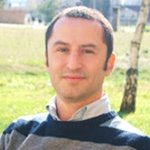 Andrés Fresno is associate professor and director of the Doctorate in Psychology at the Faculty of Psychology at the University of Talca, Chile. Since 2010 he has dedicated himself to the study of traumatic stress. He has conducted research on the relationship between child abuse, attachment, and PTSD. He has trained in therapies for the treatment of PTSD (BEPP, RT, EMDR, REWIND, CBT). He has also actively participated in the adaptation to Spanish of therapy manuals for PTSD (BEPP, RT, CBT), as well as for the evaluation of PTSD and complex PTSD. He is a founding member and current vice president of the Chilean Association of Traumatic Stress (ACET). His areas of interest are PTSD, Complex PTSD, Emotional Regulation, Child Abuse and Attachment.
Andrés Fresno is associate professor and director of the Doctorate in Psychology at the Faculty of Psychology at the University of Talca, Chile. Since 2010 he has dedicated himself to the study of traumatic stress. He has conducted research on the relationship between child abuse, attachment, and PTSD. He has trained in therapies for the treatment of PTSD (BEPP, RT, EMDR, REWIND, CBT). He has also actively participated in the adaptation to Spanish of therapy manuals for PTSD (BEPP, RT, CBT), as well as for the evaluation of PTSD and complex PTSD. He is a founding member and current vice president of the Chilean Association of Traumatic Stress (ACET). His areas of interest are PTSD, Complex PTSD, Emotional Regulation, Child Abuse and Attachment.
 Richard Meiser-Stedman is a Professor of Clinical Psychology at the University of East Anglia, having joined the university in 2014. His primary research interest is PTSD in children and adolescents. He completed his PhD and trained as a clinical psychology at the Institute of Psychiatry, Psychology and Neuroscience, KCL. Between these periods of study he was a Peggy Pollak Fellow in Developmental Psychiatry, also at the Institute. From 2009-2014 he was an MRC Clinician Scientist Fellow at the MRC Cognition and Brain Sciences Unit in Cambridge. While there he led the ASPECTS study, looking at whether early treatment for PTSD in children and adolescents. He is currently an NIHR Career Development Fellow, through which he is leading a clinical trial that evaluates cognitive therapy as a treatment for PTSD in NHS child and adolescent mental health services.
Richard Meiser-Stedman is a Professor of Clinical Psychology at the University of East Anglia, having joined the university in 2014. His primary research interest is PTSD in children and adolescents. He completed his PhD and trained as a clinical psychology at the Institute of Psychiatry, Psychology and Neuroscience, KCL. Between these periods of study he was a Peggy Pollak Fellow in Developmental Psychiatry, also at the Institute. From 2009-2014 he was an MRC Clinician Scientist Fellow at the MRC Cognition and Brain Sciences Unit in Cambridge. While there he led the ASPECTS study, looking at whether early treatment for PTSD in children and adolescents. He is currently an NIHR Career Development Fellow, through which he is leading a clinical trial that evaluates cognitive therapy as a treatment for PTSD in NHS child and adolescent mental health services.
 Patricia Watson has been a psychologist for the National Center for PTSD since 1998. Prior to that, she was an active duty Navy psychologist working with adults and children/families for eight years. Her education includes a doctoral degree in clinical psychology, and a postgraduate fellowship in pediatric psychology. She has been involved in extensive science-into-practice translation, intervention development, and program implementation, including: co-authoring the Psychological First Aid (PFA) Field Guide and the Skills for Psychological Recovery (SPR) Manual, designed to intervene in the immediate and intermediate phases after disasters and terrorism; co-authoring versions of Stress First Aid self-care/coworker support models for military, law enforcement, forest firefighters, nurses, probation officers, and rail workers, as well as public-facing versions for patients, clients, and families; and co-editing three books on disaster behavioral health interventions, and numerous publications and courses on disaster mental health, combat and operational stress, military culture, early intervention, and resilience.
Patricia Watson has been a psychologist for the National Center for PTSD since 1998. Prior to that, she was an active duty Navy psychologist working with adults and children/families for eight years. Her education includes a doctoral degree in clinical psychology, and a postgraduate fellowship in pediatric psychology. She has been involved in extensive science-into-practice translation, intervention development, and program implementation, including: co-authoring the Psychological First Aid (PFA) Field Guide and the Skills for Psychological Recovery (SPR) Manual, designed to intervene in the immediate and intermediate phases after disasters and terrorism; co-authoring versions of Stress First Aid self-care/coworker support models for military, law enforcement, forest firefighters, nurses, probation officers, and rail workers, as well as public-facing versions for patients, clients, and families; and co-editing three books on disaster behavioral health interventions, and numerous publications and courses on disaster mental health, combat and operational stress, military culture, early intervention, and resilience.
Responding to Public Health Emergencies: Mental Health Considerations During the Coronavirus Disease '19 (COVID-19) Pandemic—United States, 2020
Moderator: Judy Bass
Panelists: Robyn Cree, PhD; Rebecca Leeb, PhD; Craig W. Thomas PhD, MS
Tuesday, November 10, 2pm – 3:15pm
Note: Due to CDC regulations, this session will not be recorded or make slides available to attendees after the presentation.
Infectious disease outbreaks can have substantial negative psychological, social, and emotional consequences for affected populations. COVID-19 presents unique challenges to population mental health due to widespread impact of uncertainty for the future, social isolation, disruption in services, and economic stress. In this panel, we will first discuss the mental and behavioral health implications of infectious disease pandemics on population health, including individual behaviors (e.g., increased use of alcohol or drugs) and outcomes (e.g., worsening of chronic health problems), as well as community level outcomes, such as financial insecurity and reduced access to healthcare. Second, we will describe an emerging body of work led by the United States Centers for Disease Control and Prevention (CDC) to define and promote emotional well-being, an approach that fosters social, cognitive, and emotional skills, as a vital prevention strategy to bolster public health. Such a strategy can be used to guide emergency response and recovery efforts and to mitigate the widespread negative impacts of COVID-19 on the nation’s health and wellbeing. Finally, we will discuss how CDC coordinates with national and local partners to prevent and mitigate secondary mental health consequences of COVID-19, with attention to reducing mental health disparities among specific populations who are disproportionally affected, such as children and teens, some racial and ethnic minority groups, people with disabilities, and groups within specific geographic areas and/or settings.
 Robyn Cree, PhD, is an Epidemiologist on the Disability Science and Program Team in the National Center on Birth Defects and Developmental Disabilities (NCBDDD) at the US Centers for Disease Control and Prevention. Her work focuses on studying risk and protective factors related to mental, behavioral, and developmental disorders, particularly among people with disabilities. She serves as the technical monitor for several CDC awarded projects that promote disability inclusion in state and local public health programs. She engages in preparedness and response activities for people with disabilities as part of the Children's Preparedness Unit and At-Risk Task Force. Dr. Cree also co-leads CDC’s Mental Health Workgroup where she works to foster collaboration and advancement in the field of mental health within the agency. Dr. Cree began working with NCBDDD in 2017 as an Epidemic Intelligence Service Officer assigned to the Child Development Studies Team. She has served as a mental health subject matter expert on CDC's responses to the 2017 Hurricanes and COVID-19, helping to ensure the mental health needs of disproportionately affected populations are identified and prioritized. Dr. Cree earned a PhD in Chronic Disease Epidemiology at the Yale School of Public Health and a B.S. in Biobehavioral health from the Pennsylvania State University.
Robyn Cree, PhD, is an Epidemiologist on the Disability Science and Program Team in the National Center on Birth Defects and Developmental Disabilities (NCBDDD) at the US Centers for Disease Control and Prevention. Her work focuses on studying risk and protective factors related to mental, behavioral, and developmental disorders, particularly among people with disabilities. She serves as the technical monitor for several CDC awarded projects that promote disability inclusion in state and local public health programs. She engages in preparedness and response activities for people with disabilities as part of the Children's Preparedness Unit and At-Risk Task Force. Dr. Cree also co-leads CDC’s Mental Health Workgroup where she works to foster collaboration and advancement in the field of mental health within the agency. Dr. Cree began working with NCBDDD in 2017 as an Epidemic Intelligence Service Officer assigned to the Child Development Studies Team. She has served as a mental health subject matter expert on CDC's responses to the 2017 Hurricanes and COVID-19, helping to ensure the mental health needs of disproportionately affected populations are identified and prioritized. Dr. Cree earned a PhD in Chronic Disease Epidemiology at the Yale School of Public Health and a B.S. in Biobehavioral health from the Pennsylvania State University.
 Rebecca Leeb, PhD, is a Health Scientist/Epidemiologist on the Child Development Studies Team at the Center for Disease Control and Prevention’s National Center on Birth Defects and Developmental Disabilities. Trained as a Developmental Psychologist, Dr. Leeb joined the CDC in 2002. Prior to joining the National Center on Birth Defects and Developmental Disabilities she worked as a subject matter expert on child maltreatment prevention in the National Center for Injury Prevention and Control and spent time in the Office of the Associate Director for Science. From April 2017 to October 2019 Dr. Leeb acted as the Team Lead for CDC’s Children’s Preparedness Unit, the only group at CDC that focuses on ensuring that the unique needs of children are incorporated into all aspects of public health preparedness and response. She has participated in CDC’s emergency responses to Hurricane Katrina (2005), Zika virus (2016-2017), the 2017 and 2018 hurricane responses to Harvey, Irma, Maria, Florence and Michael, where she served as the Lead for the CDC Emergency Operations Center’s At-Risk Task Force, the 2019 response to E-cigarette/Vaping Associated Lung Injury, and the COVID-19 Response where she served in multiple roles including Lead for the Social and Behavioral Health Team. Dr. Leeb’s current work focuses on better understanding the public health importance and implications of children’s emotional wellbeing.
Rebecca Leeb, PhD, is a Health Scientist/Epidemiologist on the Child Development Studies Team at the Center for Disease Control and Prevention’s National Center on Birth Defects and Developmental Disabilities. Trained as a Developmental Psychologist, Dr. Leeb joined the CDC in 2002. Prior to joining the National Center on Birth Defects and Developmental Disabilities she worked as a subject matter expert on child maltreatment prevention in the National Center for Injury Prevention and Control and spent time in the Office of the Associate Director for Science. From April 2017 to October 2019 Dr. Leeb acted as the Team Lead for CDC’s Children’s Preparedness Unit, the only group at CDC that focuses on ensuring that the unique needs of children are incorporated into all aspects of public health preparedness and response. She has participated in CDC’s emergency responses to Hurricane Katrina (2005), Zika virus (2016-2017), the 2017 and 2018 hurricane responses to Harvey, Irma, Maria, Florence and Michael, where she served as the Lead for the CDC Emergency Operations Center’s At-Risk Task Force, the 2019 response to E-cigarette/Vaping Associated Lung Injury, and the COVID-19 Response where she served in multiple roles including Lead for the Social and Behavioral Health Team. Dr. Leeb’s current work focuses on better understanding the public health importance and implications of children’s emotional wellbeing.
 As Director of the Division of Population Health within CDC’s National Center for Chronic Disease Prevention and Health Promotion, Dr. Craig Thomas directs a broad portfolio of programmatic and applied research activities focused on improving population health across the lifespan. Specific topic areas include Alzheimer’s disease, aging, arthritis, epilepsy, mental health and emotional well-being, school health, tribal health, and population health data and analytics based on the Behavioral Risk Factor Survey System and 500 cities. Dr. Thomas joined CDC in 1998 where he has held leadership positions within a variety of public health programs including CDC’s HIV and AIDS Prevention Program, The Guide to Community Preventive Services, the Public Health Preparedness and Response Program, the National Public Health Improvement Initiative, and the PHHS Block Grant. Most recently Dr. Thomas served as Director of the Division of Public Health Performance Improvement within the Center for State Tribal, Local, and Territorial Support (CSTLTS). Dr Thomas has participated in CDC’s emergency responses to Hurricane Katrina (2005), H1N1 Pandemic (2009) and the COVID-19 Response where he served as Lead for the Social and Behavioral Health Team. Dr. Thomas earned a PhD in social psychology and applied research methods from Claremont Graduate University, a M.S in clinical psychology from California State University Fullerton, and a B.A. in biological sciences from the University of California Irvine. He has authored over 40 peer-reviewed publications, coauthored 3 book chapters, and taught several courses in public heath practice, program evaluation, and applied research methods.
As Director of the Division of Population Health within CDC’s National Center for Chronic Disease Prevention and Health Promotion, Dr. Craig Thomas directs a broad portfolio of programmatic and applied research activities focused on improving population health across the lifespan. Specific topic areas include Alzheimer’s disease, aging, arthritis, epilepsy, mental health and emotional well-being, school health, tribal health, and population health data and analytics based on the Behavioral Risk Factor Survey System and 500 cities. Dr. Thomas joined CDC in 1998 where he has held leadership positions within a variety of public health programs including CDC’s HIV and AIDS Prevention Program, The Guide to Community Preventive Services, the Public Health Preparedness and Response Program, the National Public Health Improvement Initiative, and the PHHS Block Grant. Most recently Dr. Thomas served as Director of the Division of Public Health Performance Improvement within the Center for State Tribal, Local, and Territorial Support (CSTLTS). Dr Thomas has participated in CDC’s emergency responses to Hurricane Katrina (2005), H1N1 Pandemic (2009) and the COVID-19 Response where he served as Lead for the Social and Behavioral Health Team. Dr. Thomas earned a PhD in social psychology and applied research methods from Claremont Graduate University, a M.S in clinical psychology from California State University Fullerton, and a B.A. in biological sciences from the University of California Irvine. He has authored over 40 peer-reviewed publications, coauthored 3 book chapters, and taught several courses in public heath practice, program evaluation, and applied research methods.
The Digital Revolution: Harnessing Technology to Enhance Treatment of Trauma-Related Disorders
Moderator: Jennifer Wild, DClinPsy
Panelists: Anke Ehlers, PhD; Greg Reger, PhD; Karen Seal MD, MPH; Eric Kuhn, PhD; Leslie Morland, PsyD
Thursday, November 5, 10:00am – 11:15am
The digital revolution has seen enormous benefits to treatment developments for PTSD including trauma-focused digital interventions with significant scalability and reach, innovative digital tools for enhancing therapeutic techniques, and innovative methods to train clinicians. In this panel, leading experts in the field will present their cutting-edge research and specific digital treatments or tools they have developed to enhance treatment of PTSD and related psychopathology.
- Professor Karen Seal will present her innovative training program for primary care providers, which uses "virtual worlds" training.
- Professor Eric Kuhn, an expert in web and mobile phone-based psychoeducation and self-help apps for PTSD, will present lessons learned from his work with PTSD Coach.
- Professor Greg Reger will present Virtual Reality therapy for combat-related PTSD.
- Finally, Professor Anke Ehlers will present her developments in therapist-supported internet-delivered cognitive therapy for PTSD.
The panel will discuss how their digital developments advance the field and the challenges and next steps for improving treatment and training outcomes.
 Jennifer Wild is a consultant clinical psychologist, associate professor and NIHR Oxford Health BRC Senior Research Fellow at the University of Oxford. Her area of expertise is in developing and evaluating evidence-based interventions to prevent stress-related psychopathology in at risk populations. With her team, she developed and evaluated internet-delivered cognitive training in resilience (iCT-R), which targets modifiable risk factors for post-traumatic stress disorder and depression in emergency workers. This preventative intervention is being disseminated to emergency services across England by the UK’s mental health charity, Mind. Dr Wild has worked in an advisory role to the Cabinet Office on best practice for developing preventative interventions for emergency responders. She has over 70 publications, including book chapters, and a recently published popular science book on resilience. Dr Wild regularly appears in the media giving evidence-based advice for trauma-related mental health problems.
Jennifer Wild is a consultant clinical psychologist, associate professor and NIHR Oxford Health BRC Senior Research Fellow at the University of Oxford. Her area of expertise is in developing and evaluating evidence-based interventions to prevent stress-related psychopathology in at risk populations. With her team, she developed and evaluated internet-delivered cognitive training in resilience (iCT-R), which targets modifiable risk factors for post-traumatic stress disorder and depression in emergency workers. This preventative intervention is being disseminated to emergency services across England by the UK’s mental health charity, Mind. Dr Wild has worked in an advisory role to the Cabinet Office on best practice for developing preventative interventions for emergency responders. She has over 70 publications, including book chapters, and a recently published popular science book on resilience. Dr Wild regularly appears in the media giving evidence-based advice for trauma-related mental health problems.
 Karen Seal is a Professor of Medicine and Psychiatry at the University of California, San Francisco (UCSF). Based at the San Francisco VA Health Care System (SFVAHCS), she serves as Chief of the Integrative Health Service. In this capacity and as a general internist and integrative medicine physician, she oversees several interdisciplinary clinics including a post-9/11 Integrated Care Clinic for Iraq and Afghanistan veterans, the Integrated Pain Team Clinic, and the Integrative Health and Wellness Clinic which serve high-risk, high-needs veterans. As a health services researcher she conducts randomized controlled trials and observational studies targeting problems common in veterans such as chronic pain, opioid dependence and posttraumatic stress disorder and recently completed a trial comparing a web-based versus immersive virtual worlds educational program to train primary care providers in PTSD assessment and management.
Karen Seal is a Professor of Medicine and Psychiatry at the University of California, San Francisco (UCSF). Based at the San Francisco VA Health Care System (SFVAHCS), she serves as Chief of the Integrative Health Service. In this capacity and as a general internist and integrative medicine physician, she oversees several interdisciplinary clinics including a post-9/11 Integrated Care Clinic for Iraq and Afghanistan veterans, the Integrated Pain Team Clinic, and the Integrative Health and Wellness Clinic which serve high-risk, high-needs veterans. As a health services researcher she conducts randomized controlled trials and observational studies targeting problems common in veterans such as chronic pain, opioid dependence and posttraumatic stress disorder and recently completed a trial comparing a web-based versus immersive virtual worlds educational program to train primary care providers in PTSD assessment and management.
 Eric Kuhn received a Ph.D. in Clinical Psychology from the University at Albany, State University of New York, and completed a postdoctoral research fellowship at the VA Palo Alto MIRECC and Stanford University School of Medicine. He currently serves as Acting Deputy Director of the Dissemination and Training Division of the National Center for PTSD and Clinical Associate Professor (affiliated) at Stanford University School of Medicine where he co-leads the Stanford Mental Health Technology and Innovation Hub. Dr. Kuhn is a founder of and leader in NCPTSD’s Mobile Apps Program, which has developed a suite of mobile apps designed to address PTSD and related comorbidities and currently directs the Center for Mobile Apps Research Resources and Services (CMARRS). Dr. Kuhn has federally funded programs of research focusing on using technology, both web and mobile, to increase access to and engagement in PTSD and related mental health care and to make care more patient centered, efficient, and effective.
Eric Kuhn received a Ph.D. in Clinical Psychology from the University at Albany, State University of New York, and completed a postdoctoral research fellowship at the VA Palo Alto MIRECC and Stanford University School of Medicine. He currently serves as Acting Deputy Director of the Dissemination and Training Division of the National Center for PTSD and Clinical Associate Professor (affiliated) at Stanford University School of Medicine where he co-leads the Stanford Mental Health Technology and Innovation Hub. Dr. Kuhn is a founder of and leader in NCPTSD’s Mobile Apps Program, which has developed a suite of mobile apps designed to address PTSD and related comorbidities and currently directs the Center for Mobile Apps Research Resources and Services (CMARRS). Dr. Kuhn has federally funded programs of research focusing on using technology, both web and mobile, to increase access to and engagement in PTSD and related mental health care and to make care more patient centered, efficient, and effective.
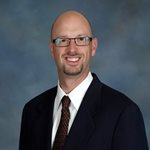 Greg Reger is the Deputy Associate Chief of Staff for Mental Health at the VA Puget Sound Healthcare System and Associate Professor of Psychiatry and Behavioral Sciences at the University of Washington School of Medicine. He has spent 16 years in DoD and VA with a research focus on the development and evaluation of innovative technologies to support Service Member and Veteran psychological health. He has helped design and evaluate a range of technologies to support mental health, including mobile apps, virtual reality exposure therapy, and computer virtual training patients. He is currently preparing to launch a randomized clinical trial to evaluate the clinical impact of PE Coach during psychotherapy for PTSD. Dr. Reger also is a US Army Veteran and serves in the Washington State National Guard as a Behavioral Health Officer.
Greg Reger is the Deputy Associate Chief of Staff for Mental Health at the VA Puget Sound Healthcare System and Associate Professor of Psychiatry and Behavioral Sciences at the University of Washington School of Medicine. He has spent 16 years in DoD and VA with a research focus on the development and evaluation of innovative technologies to support Service Member and Veteran psychological health. He has helped design and evaluate a range of technologies to support mental health, including mobile apps, virtual reality exposure therapy, and computer virtual training patients. He is currently preparing to launch a randomized clinical trial to evaluate the clinical impact of PE Coach during psychotherapy for PTSD. Dr. Reger also is a US Army Veteran and serves in the Washington State National Guard as a Behavioral Health Officer.
 Anke Ehlers is Professor of Experimental Psychopathology and Wellcome Trust Principal Research Fellow at the Department of Experimental Psychology, University of Oxford, and co-director of the Oxford Centre for Anxiety Disorders and Trauma. She is known for her work on psychological factors in anxiety disorders and posttraumatic stress disorders and their treatment. With her colleagues she developed Cognitive Therapy for PTSD, one of the evidenced-based first-line interventions for PTSD recommended by International Society for Traumatic Stress Studies (2019), National Institute for Care and Clinical Excellence (2018), and the American Psychological Association (2017). She is a Fellow of the British Academy, Academy of Medical Sciences, the German Academy of Sciences Leopoldina, and Academia Europaea. She has received several awards for her work, including the German Psychology Prize (2013), the American Psychological Association Award for Distinguished Contributions to Clinical Psychology (2014), and the Wilhelm Wundt-William James Award (2015).
Anke Ehlers is Professor of Experimental Psychopathology and Wellcome Trust Principal Research Fellow at the Department of Experimental Psychology, University of Oxford, and co-director of the Oxford Centre for Anxiety Disorders and Trauma. She is known for her work on psychological factors in anxiety disorders and posttraumatic stress disorders and their treatment. With her colleagues she developed Cognitive Therapy for PTSD, one of the evidenced-based first-line interventions for PTSD recommended by International Society for Traumatic Stress Studies (2019), National Institute for Care and Clinical Excellence (2018), and the American Psychological Association (2017). She is a Fellow of the British Academy, Academy of Medical Sciences, the German Academy of Sciences Leopoldina, and Academia Europaea. She has received several awards for her work, including the German Psychology Prize (2013), the American Psychological Association Award for Distinguished Contributions to Clinical Psychology (2014), and the Wilhelm Wundt-William James Award (2015).
 Leslie Morland is a clinical psychologist and the Director of Telemental Health Services at the Veterans Affairs San Diego Healthcare System, and a Professor of Psychiatry at the University of California, San Diego (UCSD). Dr. Morland devotes time to local and national leadership roles focused on the strategic planning and implementation of the use of technology to increase access to mental health care in the Veterans Health Administration. Dr. Morland is also a Research Psychologist at the Department of Veterans Affairs, National Center for PTSD-Pacific Islands Division where she designs and implements multiple federally funded research projects examining the clinical and cost aspects of using technology to provide evidence-based PTSD services for rural Veteran populations. In addition, Dr. Morland provides research consultation and mentorship on multiple research projects and national initiatives. Dr. Morland’s TMH research has resulted in numerous peer-reviewed publications, chapters and invited presentations.
Leslie Morland is a clinical psychologist and the Director of Telemental Health Services at the Veterans Affairs San Diego Healthcare System, and a Professor of Psychiatry at the University of California, San Diego (UCSD). Dr. Morland devotes time to local and national leadership roles focused on the strategic planning and implementation of the use of technology to increase access to mental health care in the Veterans Health Administration. Dr. Morland is also a Research Psychologist at the Department of Veterans Affairs, National Center for PTSD-Pacific Islands Division where she designs and implements multiple federally funded research projects examining the clinical and cost aspects of using technology to provide evidence-based PTSD services for rural Veteran populations. In addition, Dr. Morland provides research consultation and mentorship on multiple research projects and national initiatives. Dr. Morland’s TMH research has resulted in numerous peer-reviewed publications, chapters and invited presentations.
Invited Symposium
Global Collaboration in Traumatic Stress: Global COVID-19-Related Projects
Chairs: Sara Freedman, PhD; Tatiana Davidson, PhD; Ulrich Schynder, MD
Presenters: Miranda Olff; Christy A. Denckla; Karestan C. Koenen, PhD; Chris Hoeboer; Alexandra De Young, PhD
Saturday, November 14, 11:30am – 12:45pm
The COVID-19 outbreak is a global problem: an unprecedented pandemic and public health emergency of international concern that threatens lives and well-being of the world population. The Global Collaboration of Traumatic Stress (GS-TS) created a global task force dedicated to fostering collaboration on COVID-19-related traumatic stress projects across the world, including policy, best practices and research. Over the last several months we have worked with researchers and clinicians around the world to enhance knowledge about and address psychotrauma due to COVID-19 globally. In this symposium we will discuss findings related to traumatic stress responses to COVID-19 around the world, associated physical and psychological short- and long-term consequences, unique stressors and clinical impact of COVID-19 on vulnerable populations including pregnant women and young children, and dissemination of best-practice skills for managing stress and enhancing resilience.
Stress Responses to COVID-19 Around the World
Chris Hoeboer, MSC; Prof. Miranda Olff; Indira Primasari, MSc; Yulan Qing, MSc; Bruno M Coimbra MSc; Ani Hovnanyan, MSc; Emma Grace, PhD; and The GPS-CCC Consortium
We evaluated stress responses to the coronavirus disease 2019 (COVID-19) pandemic around the world and compared these responses to stress responses to other stressful events in the same period. Data were collected in the Global Psychotrauma Screen – Cross-Cultural responses to COVID-19 (GPS-CCC) study as part of the Global Collaboration on Traumatic Stress between the 25th of April and the 3rd of September in 2020. Globally, 6,162 surveys of the GPS from 83 countries in 12 United Nation (UN) regions were completed—of which 1,684 involved exposure to COVID-19-related events and 4,478 to involved exposure to other stressful events. We found that COVID-19-related events were related to somewhat more severe stress responses than other stressful events, including symptoms of PTSD, anxiety, depression, insomnia and dissociation. This pattern differed between UN regions. A higher number of confirmed COVID-19 cases per million inhabitants in a respondent’s country was related to more severe stress responses after COVID-19-related events compared to other stressful events. We will also present results of topic modelling and a network analysis comparing COVID-19 with other stressful events. In conclusion, the results show that COVID-19 leads to a wide range of mental health problems especially in countries more severely affected by the pandemic. Hence, broad screening of mental health consequences of COVID-19 is crucial.
Psychological Effects of COVID19: An International Longitudinal Study
Sara Freedman, PhD and Talya Green, PhD
Public health responses to pandemics are concerned with physical impacts and emotional reactions as well as their relationships with longer-term illness and psychological outcomes. Studies from previous pandemics are scarce and indicate that quarantine has both short- and long-term psychological consequences. Emerging studies from COVID-19 paint a similar picture. Most studies have examined individuals either before or following a potential pandemic, thus limiting the understanding of the changes in symptoms over time. This global longitudinal online study used weekly assessments of a large group of people while COVID-19 was developing. The questionnaires were available in English, Spanish, Italian and Hebrew using the Qualtrics platform. The first assessments took place in the second half of March 2020 and were followed by 12 weekly assessments. Participants answered questions regarding demographics, COVID-19 symptoms and diagnosis, quarantine, worry about COVID19, social media use regarding COVID 19, anxiety (GAD7) and depression (PHQ9). PTSD symptoms regarding COVID-19 events were assessed at the first and last assessments (PCL5). In total, 1,750 participants from more than 30 countries answered the initial assessment. Follow-up assessments were completed by approximately 10% of each language group. Results regarding changes over time will be presented. Implications for mitigating psychological distress will be discussed.
Public Health Approaches to Mitigating the Toxic Mental Health Effects of the COVID-19 Pandemic
Karestan C. Koenen, PhD; Christy A. Denckla, PhD; Shaili Jha, PhD; and Hannah Kim, MSc
The COVID-19 pandemic, along with the some of the critical public health measures necessary to control its spread, are exerting a disproportionate toll on the most vulnerable including pregnant women, communities of color, and the economically marginalized. Here we discuss two public health measures deployed in response to this need. First, we discuss a multi-methods survey conducted of pregnant and recently pregnant women during COVID-19. The survey, which included 7,500 women, was conducted in 64 countries between May 26, 2020, and June 13, 2020; advertised predominantly through online social media campaigns and parenting forums; and available in 12 different languages. We will share results of our initial analyses and discuss implications for practice. Then we will conclude by describing the REACH project, which aims to bring evidence-based skills on managing stress and enhancing resilience to everyone around the world. This coordinated effort to “Do the Five for Mental Health” includes the following: "Recognize the Problem," "Expand the Social Safety Net," "Assist Those Most at Risk," "Cultivate Resilience" and "Have Empathy." Since inception, 16 sessions featuring a total of 29 mental health experts from the U.S., New Zealand, Australia, the U.K., Kenya and South Africa have brought together up to 800 attendees per session from around the world.
COVID-19 Unmasked Global Collaboration: Understanding the Mental Health Impacts of COVID-19 on Young Children (1-5 Years) and Their Families
Alexandra De Young, PhD, and Meghan Marsac, PhD
COVID-19 Unmasked is an online study that was launched in Australia in May 2020 to advance urgent research into understanding the mental health impacts of the pandemic on young children (1-5 years) and their families. Eight other countries (U.S., Scotland, Netherlands, Spain, Turkey, Poland, Greece and Cyrpus) have joined the global collaboration. The survey is completed on four occasions (baseline and 3, 6 and 12 months) to (1) identify the challenging and positive experiences children and families have faced during this time (2) understand the impact of the COVID-19 pandemic on the social and emotional wellbeing of infants and preschoolers. (3) determine the impact of the COVID-19 pandemic on parents' mental health, and (4) identify the risk and protective factors for child mental health outcomes. The information will be used to promote positive wellbeing and resilience and will help prevent the development and exacerbation of mental health problems over the next 12 months through rapid reporting of results and dissemination of evidence-based resources. This presentation will discuss the aims of the global collaboration and present the early findings from the Australian and U.S. datasets.
 Miranda Olff is leading the Centre for Psychological Trauma at the department of Psychiatry at the Amsterdam UMC (AMC) of the University of Amsterdam and is Director of Research & Strategy at the ARQ National Psychotrauma Centre (ARQ). She has distinguished professorships in Norway, China and Iran. She has been trained in Corporate Governance and has several committee/advisory board positions (e.g. MH17 disaster foundation, The Violent Offences Compensation Fund). Miranda Olff is founding Editor-in-Chief of the European Journal of Psychotraumatology (EJPT), an open access journal owned by the European Society for Traumatic Stress Studies (ESTSS) and launched when she was president of ESTSS. She also is a past president of the International Society for Traumatic Stress Studies (ISTSS). Miranda Olff is chair of the Global Collaboration on Traumatic Stress, a collaborative of traumatic stress societies that joined forces to tackle traumatic stress topics of global importance.
Miranda Olff is leading the Centre for Psychological Trauma at the department of Psychiatry at the Amsterdam UMC (AMC) of the University of Amsterdam and is Director of Research & Strategy at the ARQ National Psychotrauma Centre (ARQ). She has distinguished professorships in Norway, China and Iran. She has been trained in Corporate Governance and has several committee/advisory board positions (e.g. MH17 disaster foundation, The Violent Offences Compensation Fund). Miranda Olff is founding Editor-in-Chief of the European Journal of Psychotraumatology (EJPT), an open access journal owned by the European Society for Traumatic Stress Studies (ESTSS) and launched when she was president of ESTSS. She also is a past president of the International Society for Traumatic Stress Studies (ISTSS). Miranda Olff is chair of the Global Collaboration on Traumatic Stress, a collaborative of traumatic stress societies that joined forces to tackle traumatic stress topics of global importance.
 Christy A. Denckla is a clinical psychologist with joint appointments as a Research Associate in the Department of Epidemiology at the Harvard T.H. Chan School of Public Health, a Research Fellow at the Stanley Center for Psychiatric Research at the Broad Institute of MIT and Harvard, and an Instructor in Psychiatry at Massachusetts General Hospital, Harvard Medical School. Her work aims to understand how adversity affects mental health and well-being across the lifespan, with a particular focus on bereavement. Dr. Denckla’s work is funded by an early career K23 award from the National Institute of Mental Health. She completed her postdoctoral fellowship in Psychiatric Epidemiology at the Harvard T.H. Chan School of Public Health, and her clinical psychology internship at Massachusetts General Hospital, Harvard Medical School. Her doctoral research was completed at Adelphi University in New York.
Christy A. Denckla is a clinical psychologist with joint appointments as a Research Associate in the Department of Epidemiology at the Harvard T.H. Chan School of Public Health, a Research Fellow at the Stanley Center for Psychiatric Research at the Broad Institute of MIT and Harvard, and an Instructor in Psychiatry at Massachusetts General Hospital, Harvard Medical School. Her work aims to understand how adversity affects mental health and well-being across the lifespan, with a particular focus on bereavement. Dr. Denckla’s work is funded by an early career K23 award from the National Institute of Mental Health. She completed her postdoctoral fellowship in Psychiatric Epidemiology at the Harvard T.H. Chan School of Public Health, and her clinical psychology internship at Massachusetts General Hospital, Harvard Medical School. Her doctoral research was completed at Adelphi University in New York.
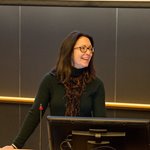 Karestan C. Koenen (@karestankoenen), a clinical psychologist, epidemiologist and author, is Professor of Psychiatric Epidemiology at the Harvard T.H. Chan School of Public Health where she aims to reduce the population burden of mental disorders through research, training and advocacy. She is passionate about using science to overcome violence and trauma, which are major preventable causes of health problems globally. At Harvard, Koenen Dr. Koenen leads the NIMH-funded Harvard Training Program in Psychiatric Genetics and Translational Research and the Interdisciplinary Concentration in Population Mental Health. Koenen is past president of the International Society for Traumatic Stress Studies and an elected fellow in the American Psychopathological Association. Koenen has received several awards recognizing her research achievements including the Award for Outstanding Contributions to the Science of Trauma Psychology, from the American Psychological Association, Division 56, and the Robert S. Laufer Memorial Award from the International Society for Traumatic Stress Studies. She is a regular contributor and her work is has been featured in a range of public media including in Cogniscenti, The Hill and Thrive Global. Her most recent book is Treating Survivors of Childhood Abuse and Interpersonal Trauma authored with Drs. Marylene Cloitre, Lisa R Cohen, Kile M. Ortigo and Christie Jackson.
Karestan C. Koenen (@karestankoenen), a clinical psychologist, epidemiologist and author, is Professor of Psychiatric Epidemiology at the Harvard T.H. Chan School of Public Health where she aims to reduce the population burden of mental disorders through research, training and advocacy. She is passionate about using science to overcome violence and trauma, which are major preventable causes of health problems globally. At Harvard, Koenen Dr. Koenen leads the NIMH-funded Harvard Training Program in Psychiatric Genetics and Translational Research and the Interdisciplinary Concentration in Population Mental Health. Koenen is past president of the International Society for Traumatic Stress Studies and an elected fellow in the American Psychopathological Association. Koenen has received several awards recognizing her research achievements including the Award for Outstanding Contributions to the Science of Trauma Psychology, from the American Psychological Association, Division 56, and the Robert S. Laufer Memorial Award from the International Society for Traumatic Stress Studies. She is a regular contributor and her work is has been featured in a range of public media including in Cogniscenti, The Hill and Thrive Global. Her most recent book is Treating Survivors of Childhood Abuse and Interpersonal Trauma authored with Drs. Marylene Cloitre, Lisa R Cohen, Kile M. Ortigo and Christie Jackson.
 Sara Freedman, PhD, is an Associate Professor in the School of Social Work, Bar Ilan University, Israel. She trained as a clinical psychologist in the U.K. (Institute of Psychiatry, University of London) and as a social worker in Israel (Hebrew University, licensed since 1998). From 2000 to 2016, Professor Freedman was the founder and Clinical Director of the Cognitive Behavior Therapy Unit, in the Department of Psychiatry, Hadassah Hebrew University Hospital, comprising an outpatient service for depression and anxiety disorders and a two-year training course in CBT for mental health professionals. Professor Freedman's research has focused on the course and development of Posttraumatic Stress Disorder (PTSD), PTSD following terror attacks, the use of CBT as an early intervention for PTSD and virtual reality treatment for PTSD. Professor Freedman is the Chair of the recently formed Israel Society For Traumatic Stress Research and is also a Committee Member in the Israel Society For CBT (ITA).
Sara Freedman, PhD, is an Associate Professor in the School of Social Work, Bar Ilan University, Israel. She trained as a clinical psychologist in the U.K. (Institute of Psychiatry, University of London) and as a social worker in Israel (Hebrew University, licensed since 1998). From 2000 to 2016, Professor Freedman was the founder and Clinical Director of the Cognitive Behavior Therapy Unit, in the Department of Psychiatry, Hadassah Hebrew University Hospital, comprising an outpatient service for depression and anxiety disorders and a two-year training course in CBT for mental health professionals. Professor Freedman's research has focused on the course and development of Posttraumatic Stress Disorder (PTSD), PTSD following terror attacks, the use of CBT as an early intervention for PTSD and virtual reality treatment for PTSD. Professor Freedman is the Chair of the recently formed Israel Society For Traumatic Stress Research and is also a Committee Member in the Israel Society For CBT (ITA).
 Chris Hoeboer is a postdoctoral researcher at the department of psychotrauma at Amsterdam UMC. His current research focuses on improving mental health of victims of interpersonal partner violence, validation and use of the Global Psychotrauma Screen and use of statistical algorithms to predict psychopathology in the field of psychotrauma. He aims to use innovative statistical methods with a clear clinical relevance in his projects. Chris graduated in 2017 from the clinical and health research master in Leiden. Thereafter, he started his PhD at the IMPACT study, a large randomized controlled trial comparing three variants of exposure therapy for posttraumatic stress disorder related to childhood abuse. Chris is currently finishing his PhD in which he focuses on improving treatment outcome by performing prediction and moderation analyses and by using machine-learning algorithms. He also performs temporal sequencing analyses to determine the temporal relationship between working mechanisms of exposure therapy and treatment outcome using dynamic panel models. Moreover, Chris is involved in several other projects including a case series about the effectiveness of Narrative Exposure Therapy for patients with PTSD related to childhood trauma and a study about the influence of childhood emotional abuse on treatment outcome in adolescents. In 2020, Chris received a research visiting grant from the KNAW to work together with Professor Lutz and colleagues from the University of Trier on his paper about personalization of PTSD treatment using machine-learning algorithms.
Chris Hoeboer is a postdoctoral researcher at the department of psychotrauma at Amsterdam UMC. His current research focuses on improving mental health of victims of interpersonal partner violence, validation and use of the Global Psychotrauma Screen and use of statistical algorithms to predict psychopathology in the field of psychotrauma. He aims to use innovative statistical methods with a clear clinical relevance in his projects. Chris graduated in 2017 from the clinical and health research master in Leiden. Thereafter, he started his PhD at the IMPACT study, a large randomized controlled trial comparing three variants of exposure therapy for posttraumatic stress disorder related to childhood abuse. Chris is currently finishing his PhD in which he focuses on improving treatment outcome by performing prediction and moderation analyses and by using machine-learning algorithms. He also performs temporal sequencing analyses to determine the temporal relationship between working mechanisms of exposure therapy and treatment outcome using dynamic panel models. Moreover, Chris is involved in several other projects including a case series about the effectiveness of Narrative Exposure Therapy for patients with PTSD related to childhood trauma and a study about the influence of childhood emotional abuse on treatment outcome in adolescents. In 2020, Chris received a research visiting grant from the KNAW to work together with Professor Lutz and colleagues from the University of Trier on his paper about personalization of PTSD treatment using machine-learning algorithms.
 Alexandra De Young is an early career researcher and clinical psychologist. She is appointed as a (1) Service Evaluation & Research Coordinator, Queensland Centre for Perinatal and Infant Mental Health (QCPIMH), Children’s Health Queensland (CHQ) and (2) Postdoctoral Research Fellow, School of Psychology & Centre for Child Health Research, University of Queensland (UQ). De Young’s major research focus and expertise is in paediatric trauma including assessment, diagnosis and treatment of infant and early childhood mental health. Her major work to date has included leading a global collaboration to understand the mental health impacts of the COVID-19 pandemic on young children and families; a multi-site international RCT that found efficacy for the first early intervention to prevent PTSD in young injured children; the state-wide rollout of resources for families, health professionals and educators in natural disaster contexts; and the implementation of trauma-informed care interventions in a paediatric hospital setting.
Alexandra De Young is an early career researcher and clinical psychologist. She is appointed as a (1) Service Evaluation & Research Coordinator, Queensland Centre for Perinatal and Infant Mental Health (QCPIMH), Children’s Health Queensland (CHQ) and (2) Postdoctoral Research Fellow, School of Psychology & Centre for Child Health Research, University of Queensland (UQ). De Young’s major research focus and expertise is in paediatric trauma including assessment, diagnosis and treatment of infant and early childhood mental health. Her major work to date has included leading a global collaboration to understand the mental health impacts of the COVID-19 pandemic on young children and families; a multi-site international RCT that found efficacy for the first early intervention to prevent PTSD in young injured children; the state-wide rollout of resources for families, health professionals and educators in natural disaster contexts; and the implementation of trauma-informed care interventions in a paediatric hospital setting.